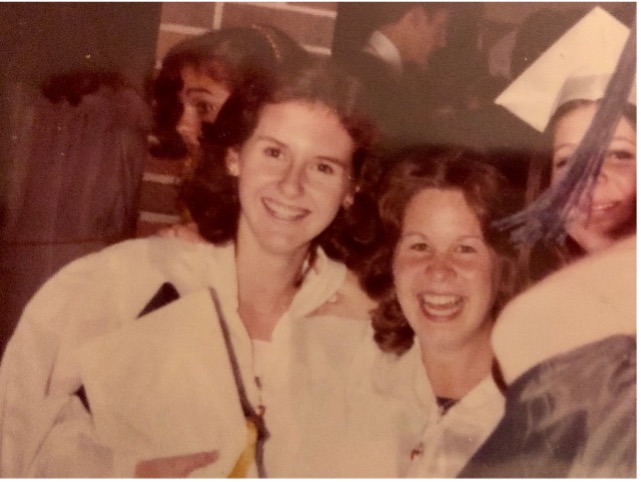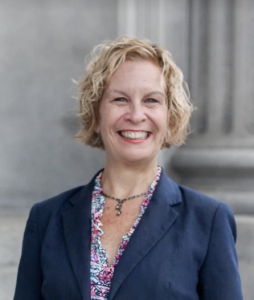Season for Reflection
May 22, 2024
By Reba Hull Campbell
As a milestone anniversary of my high school graduation hits this year, old photographs I recently unearthed prompted some reflection over the many life lessons I’ve learned since that day.
A lot has changed since 1979 when my friends and I walked across the gym stage to graduate. That newly minted graduate had no idea what was in store for the next 45 years of a winding, yet in retrospect, amazingly aligned career path. I also had no idea of the lessons I would learn along the way.
Over the years during this season of graduation and new beginnings, I have fine-tuned a list of life lessons for new graduates and young professionals. I like to revisit and update this list annually as a way to reflect on the past year.

- Take risks. Be curious and look for the unexpected opportunities. No one can expect perfection. It’s OK to be a beginner. You can often learn more from mistakes than successes. Yes, really, you can.
- Cultivate strong writing skills. Solid writers are the people strong leaders want around the leadership table with them. Be the one who colleagues seek out to clearly articulate ideas on paper using accurate spelling, grammar and punctuation. Even if writing isn’t a priority part of your job, be the one on the team who can use the written word to quickly break down and communicate concepts.
- Go to your boss with a solution, not a problem. Your boss is solving problems all day. Make her life easier by presenting a solution when you present a problem. Even if it’s not the solution that ultimately solves the problem, presenting an idea for a solution keeps your boss from dreading the sight of you at the door or your number on his phone.
- Keep up with people. The students you sit next to in class. Your roommates and their friends. Bosses in your entry level college jobs. Lab partners. Professors. The people you meet through your campus activities. College deans. They will all have contacts within their professional circles. Stay in touch with them. You never know where a new job contact, sales relationship or your next stellar employee will come from.
- Be interested and interesting. Ask good questions and ask them often. Young professionals have a great deal to offer a work environment. Speak up when you have something to offer, but remember to balance your enthusiasm with senior-level colleagues’ experience.
- Keep learning your craft. Find out what your boss or leaders in your profession are reading or listening to (books, blogs, professional publications, podcasts, websites, etc). Seek out professional development opportunities. Pay for them yourself, if necessary. Join professional organizations and get involved.
- Be kind and remember that everyone carries their own sack of rocks. You never know what type of personal issues the co-worker who missed a deadline is dealing with at home or with his family.
- Write thank-you and follow-up notes (handwritten, not emailed). Collect business cards or contact info from people you meet at events, in meetings, or just out and about. A handwritten “nice to meet you” note will set you apart and help people you meet remember you. Technology is good, but the personal touch still matters (along with good penmanship).
- Travel any chance you get. Travel to small towns and big cities across the country and around the world. Don’t put off travel – use your vacation days.
- Plan the work before you work the plan. Having no plan gets you nowhere. Plans will invariably change either by force or circumstance. Be flexible, but have a plan regardless of whether it’s a work project, a trip, a job search, a major purchase or an important life decision.
- Looking busy doesn’t equal being productive. The co-worker who crows about her heavy workload and long hours is probably much less productive than the one who is organized and prioritizes his days.
- Be a good listener and observer. It’s an old adage, but true – there’s a reason we have two ears and one mouth. Watching and listening to others can bring valuable insights to the words you eventually speak.
- Stay in the loop, but avoid the gossip. Be a “boundary spanner”— someone who is respected and trusted by people at all levels of the organization. Just don’t be the one who everyone counts on to know “the dirt.”
- Build your financial literacy. Pay yourself first. If you use direct deposit, set up an allocated amount to go to your savings account from each paycheck. If you get the chance to participate in your company’s 401K, do it! Even that smallest contribution early in your career will help you establish good saving and investment habits. Learn the basics of budgeting, saving and investing. Keep your rainy day fund separate from your retirement dollars.
- Seek out a mentor. I’ve found most mentor relationships happen naturally rather than being established formally. Also, look for “reverse mentoring” opportunities. You can be a resource to your older colleagues. Seasoned professionals can learn a great deal from their younger peers.
- A good editor will make you shine. Don’t look at having your writing edited as you would look at a teacher correcting a paper. Editing is a collaborative process, and there’s always room for improvement in your writing.
- Move during the day. Regardless of whether you have a desk job, use your lap as your desk on the couch or work outside of a traditional office environment, moving your body and getting your brain engaged in something other than your work is key to sanity and creativity. Walk around the block, stretch once an hour, or put in your earbuds and listen to high energy music.
- Sharpen your speaking skills. A strong speaking presence doesn’t come naturally to everyone, but practice can help anyone improve. Seek out opportunities to speak up in meetings, identify your pain points, practice in front of a mirror, watch speakers you admire. Learn to be the one in the room who can catch – and keep – people’s attention.
- Establish your personal brand. Decide what you want your reputation to be, and let your actions define you. Keep promises and make deadlines. Under-promise and over-deliver. Avoid behavior in your personal life that could hurt your professional life (even more true today with all the risks of social media in the mix). Remember that details count, especially when getting the details right sets you apart from others.
- Have fun and be creative. Figure out your own version of work/life balance. The “balance” will probably fluctuate daily, but keep focused on creative outlets, exercise and hobbies that let you have fun.
Following my own advice
Over the past several years, I’ve realized it’s never too late to follow my own advice while launching into my latest professional adventure as a business owner at The Medway Group. I’ve connected my love of writing (#2) and editing (#16) with the relationships I’ve developed over my career (#4, #15) to build a thriving consulting business.
I’ve spent a lot of time evaluating my strengths, identifying opportunities, learning all I could about being an entrepreneur (#6), asking questions and seeking advice (#12), and plotting a plan (#10).
I’m also making sure not to overlook the importance of that balance we hear so much about (#20) by making time for my music, family, friends, and travel (#9). And I keep sending those hand-written thank you notes (#8).
Reba’s career experience in Washington, DC and South Carolina includes policy and political campaign leadership positions for local, state and federal candidates; director of a statewide educational foundation; interim president and VP for SCETV; and deputy director of a statewide advocacy organization. Currently, Reba is on the faculty at the Buckley School of Public Speaking and leads the Medway Group, a communications consulting business she founded in 2022. She plays uke, guitar and keyboard in a band and travels whenever possible. She can be reached at [email protected].























